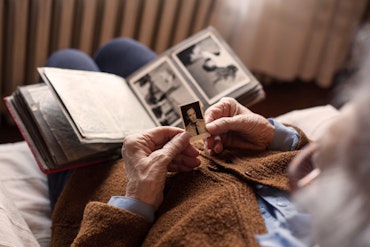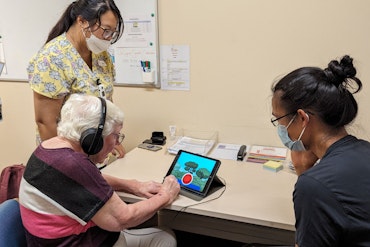What do young people gain from aged care work?
Kay hopes that her inspiring and insightful experience may offer younger workers an amazing alternative to their career plans.

Kay works for a non-profit organisation that hires young workers to provide care for older people. Kay’s days are filled with aged care nurture, leading to nights spent with nature. Following an afternoon spent helping her older client plant vegetable seedlings, Kay takes a fresh clipping of chives to the kitchen before heading home. (Source: Image courtesy of Think/HQ)
Key points:
- While working towards a criminology degree, Kay is on the frontlines of the aged care industry
- The theory behind care and the dynamic of a personalised approach fuels Kay’s passion for supporting others
- One-in-three workers in Australia are considering resigning from their current jobs following the COVID-19 pandemic, according to recent research by the University of Melbourne
The variety of care and support roles on offer is something which Kay, a relatively new recruit into the sector, says is surprising.
“I was actually pretty hesitant when I applied because I didn’t have much experience in personal care,” she explains, “but it’s not all personal support oriented, and you don’t always need a qualification in disability or aged care to do some of the roles.”
Kay first became curious about working in the care and support sector during her university degree in the field of criminology. She finds the theory behind care and support work and the social connection it creates in communities to be absolutely fascinating. As an individual support worker, Kay’s role involves helping older people with gardening and technology, running workshops to help them learn computer skills, and recruiting more young people to join the care and support sector.
Tending to a vegetable garden with the people she cares for is a regular gig for the university student, who visits one of her clients every fortnight to provide an extra set of hands.
“My client enjoys gardening, but because of her mobility issues she has trouble doing it. So, we’ve been working on the garden together while having a chat,” Kay explains, stating that gardening is a regular point of interest for her clients.
Kay’s workplace trains people under the age of 25 to work with older people who need help with independence, connection and wellbeing at home. Her organisation provides young people with the tools and space to develop genuine connections with the older people they care for.
The jobs on offer at Kay’s workplace range from providing a lift to social activities to doing chores around the client’s home and working on art projects with clients. Kay recalls an older woman she cares for who is an avid painter and printmaker.
“We often head out to a café and meet her artist friends,” she says. “We’ll chat about art and what it’s like to grow up in Australia from a different cultural background. It’s just a really nice conversation.”
As an emigrant from Hong Kong, Kay finds her understanding of the migrant experience is especially helpful when supporting people from different cultures.
“Providing support and social connection is good for my own personal growth, and I feel like I’m able to make use of that intercultural knowledge I have as well,” she says.
Looking to the future, Kay intends to continue with postgraduate study to enact meaningful change, but says her time in the field with aged care clients is a life-changing and insightful experience which she encourages other young people to pursue.
Regarding the direction of her career and the impact of her work experience on the nature of her postgraduate goals, Kay says she wants to develop policies to support care recipients within the industry, along with disability and veteran care support clients.
“Seeing someone’s face light up when you help them gives you a really special sense of purpose,” she concludes.























